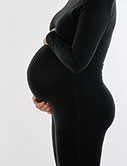Pre-Pregnancy Diabetes Boosts Risk for Birth Defects
Women 3 to 4 times more likely to deliver baby with at least one problem, U.S. study finds.
|
E-mail this article
Subscribe to news
Printer friendly version
|

(SOURCE: U.S. Centers for Disease Control and Prevention, news release, July 30, 2008)
WEDNESDAY, July 30 (HealthDay News)-- Women who develop diabetes before they become pregnant are three to four times more likely than non-diabetic women to have a baby with at least one birth defect, says a U.S. Centers for Disease Control and Prevention study.
This is the first study to identify the wide range of birth defects -- such as heart defects, brain and spine defects, oral clefts, limb deficiencies, and defects of the kidneys and gastrointestinal tract -- associated with pre-pregnancy diagnoses of type 1 or type 2 diabetes.
The study was published in the American Journal of Obstetrics & Gynecology.
"The continued association of diabetes with a number of birth defects highlights the importance of increasing the number of women who receive the best possible preconception care, especially for those diagnosed with diabetes," lead author Dr. Adolfo Correa, an epidemiologist at the CDC's National Center on Birth Defects and Developmental Disabilities, said in a CDC news release.
"Early and effective management of diabetes for pregnant women is critical in helping to not only prevent birth defects, but also to reduce the risk for other health complications for them and their children," Correa addedd.
In addition, preconception care should be considered and promoted for women with pre-pregnancy obesity, which is a known risk factor for both diabetes and birth defects, Correa and colleagues recommended.
For this study, the researchers analyzed data on more than 30,000 people seen at nine birth defects centers across the country.
Birth defects affect one in 33 infants and are a leading cause of infant death, according to background information in the CDC news release. While risk factors for some birth defects have been identified, the cause of most birth defects is unknown.
More information
The Nemours Foundation has more about birth defects. 
Copyright © 2008 ScoutNews, LLC. All rights reserved. 
HealthDayNews articles are derived from various sources and do not reflect federal policy. healthfinder.gov does not endorse opinions, products, or services that may appear in news stories. For more information on health topics in the news, visit the healthfinder.gov health library.